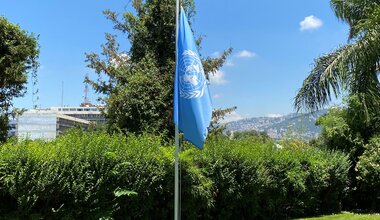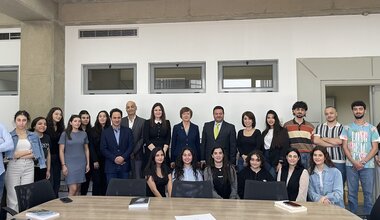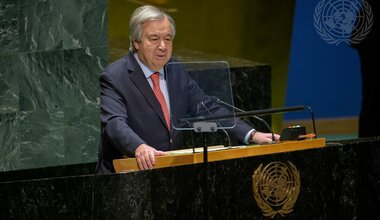Lebanon Prime Minister and UN Deputy Secretary-General Launch Lebanon Crisis Response Plan
Beirut, Lebanon
15 December 2014
The Lebanese Prime
Minister, Tamam Salam, and the UN Deputy Secretary-General, Jan Eliasson,
launched today at the Grand Serail, the Lebanon Crisis Response Plan. The plan
outlines the priorities of the Government and the international community for
the coming two years to respond to the crisis in country.
During his second visit
to Lebanon since the start of the Syrian Crisis, the UN Deputy Secretary-General
reiterated the commitment of the United Nations to support the Lebanese people
and Government to respond to the vital needs generated by the flight of over
one million people into the country.
As the year ends, 1.2
million Syrians are registered as refugees with UNHCR in Lebanon with many more
present but unregistered. Four out of five are women and children. Most have
difficulties meeting their minimum survival needs through their own household
expenditures. These join 270,000 Palestine refugees who were already in country
and an estimated 330,000 Lebanese living in poverty. In total, over 2 million
people in country – most of them concentrated in the poorest communities - are
now vulnerable to the worst effects of poverty: homelessness, illness and
malnutrition, and negative coping strategies such as child labor or child
marriage. Youth are the worst affected.
Four years into the
crisis, the communities that have so generously welcomed the refugees are
reaching a critical point. Public services are overwhelmed, economic growth has
faltered and unemployment is rising at record rates. As social tensions grow,
Lebanon is deeply concerned to protect its fragile stability. “The Lebanese
people have opened their homes to our brothers and sisters fleeing the conflict
in Syria. They have shared their land, their schools, their food and their
water. But now their own needs for work
and services also need to be met if we are to avoid a crisis in country”, said
the Prime Minister of Lebanon Tamam Salam.
The Lebanon Crisis
Response Plan launched today aims to address these problems. Jointly elaborated
between the Government of Lebanon and the United Nations, the plan aims to
ensure that the response to the Syria crisis tangibly benefits Lebanon and
helps to stabilize the country during this difficult period. It continues the
necessary work of delivering protection and humanitarian assistance to families
displaced from Syria, while expanding plans to invest in Lebanese services,
economies and institutions in the poorest and at-risk areas. With funding requirements estimated at 2.1 billion USD, the plan
hopes to reach up to 2.9 million people most in need; half of which are Lebanese.
“The Lebanese people and its institutions have
been the first respondents and the largest donors to this crisis. Their most
vulnerable should not, however, pay a disproportionate price for another
country’s conflict” said Jan Eliasson, Deputy Secretary-General. “I call on the
international community to increase their solidarity with the Lebanese people.
The crisis in Lebanon is not just their problem. It should also be ours. Failing
to invest in Lebanon’s resilience could have tragic consequences for vulnerable
Lebanese, Syrians and Palestinians alike,” underlined the Deputy
Secretary-General.
PDF Version:
 UN
UN



